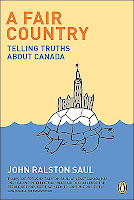His final summary is, I think, bang on.
The following points then are intended as an illustration of how the language of a preamble could form part of the church’s confession. Here, the church speaks not from a position of privileged insight into God’s ways, but from a vulnerable position of pilgrimage within history. The church does not occupy an elevated ‘view from nowhere’, so that it could survey the whole arc of human history at a single glance. Standing within history, the church sees another world to which it humbly bears witness. Listening to the voices of indigenous believers, the church hears Christ’s own voice calling, and so is compelled to confess:
- Guided by Jesus Christ, the church’s Second Peoples listen attentively to the voices of our indigenous brothers and sisters, knowing that we cannot be the church without them, and that we cannot have Christ except together with them;
- we rejoice in their witness to the Creator God who was already at work in this land, through Christ and the Spirit, long before the arrival of the colonisers;
- in this witness, the church hears and recognises the word of Christ—a word that judges us for our cultural imperialism, our spiritual paternalism, and our hardness of heart; and that graciously liberates us to become together the people of God;
- together with the First Peoples of this land, our brothers and sisters in Christ, we confess that there is one body, one Spirit, one Lord, one faith, one baptism, one God and Father of all. Together we entrust ourselves to this God, pledging to journey together as Christ’s disciples: to speak the truth in love, to bear one another’s burdens, and to seek and find Christ in one another along the way.


